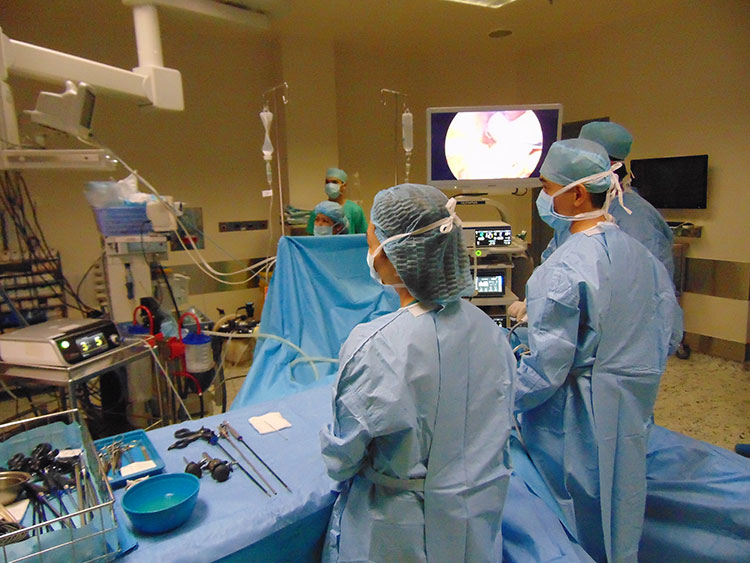For any patient, the first impression of Dr. Thai is the image of an agile man with calm and friendly voice. However, not many people known that he is the physician of strong minded to cure hard cases and of a determination to regain lives for his patients.
I heard of Dr. Phan Van Thai when he was participating in a giant tumor mass cutting operation for patient Nguyen Duy Hai (from Da Lat) in 2012. I had an appointment with him at 2 o’clock in the afternoon but it took me quite a time after that to finally meet him personally because he was having patients in line. A nurse told me he never has lunch time. When I asked if he felt any tired, he just smiled gently: “I only get tired when I did not do the good thing, it’s normal for me to see the patients.”
Risking is not a way to gain experience
I asked him curiously that why he had no serious mistakes during the years of practice and if he only chooses safe cases required less efforts. He laughed and said: “While being at school, I thought I have to take chances and risks, but in reality now there are things I can’t anticipate. Risking is not the way to gain experience.”
Working in the medical field, Dr. Thai always has the clear principles that he did not choose the “recklessness”, but spend much effort to go on the meticulous and more careful way. To be able to save the patient, he concentrated on cultivating knowledge in the thought that the more the knowledge he gains, the less wrong he makes. In treatment he always “knows 10 parts but only does 7 parts”. His strange principle is explained that “surgeries develop complicatedly, sometimes beyond his reach” and that people are not always 100% right, so every step should be careful. For him, medical ethics is not something too far away but doing everything in our own capacity. That means he always puts the patient’s safety in the highest level.
Although he is an expert in surgery of thyroid, liver, gall, pancreas, stomach, colon etc., when performing appendectomy, the type he has done a thousand times, he was never subjective even a small detail. He operates the cases from the beginning to the end of the surgery and also checks the equipment himself before beginning the surgery.

Never refuse critical cases
Born and raised from a common family in Hue city, at the very young age, Dr. Thai have longed for the pursuit of medicine and want to save people. That desire also influences his notion of success: “The success of the operation is to save people, not to make income.”
In fact, before a case, he always studies carefully and finds out the best treatment, by medication or surgery, which is more beneficial to patients. He uses all of his experience, knowledge and even the hunch of a physician for treating any cases he calls that “9 part dead 1 part live”. These cases usually happen to older patients or to those who suffer from plenty of diseases at the same time.
He shares that there are many cases of which the chance of success is very small but he never says “no”. He remembers a 90-year-old woman who was hospitalized with a diagnosis of colon perforation and the fluid had spread to the abdomen. Although her family had prepared themselves for the worse situation and the case had hopelessness of success, Dr. Thai still embarked on the surgery immediately. For 3 hours, he and the team rescued the colon perforation, cleared the abdominal cavity and successfully resuscitated the patient in the surprise and joy of her family.
At such decisive moments, he expressed his toughness by saying that:
He said he can promote his own strengths because FVH has created an international standard environment where everything is guaranteed by a strict process recognized by JCI. In addition, if suspecting something is not correct, the council, the board and colleagues will flexibly support him in time. He recalled another special case of colon cancer which had badly affected to the liver. Before performing the 8-hour-long operation, he co-ordinated with the imaging physicians and consulted with his colleagues to consider and requested a change of shift to prepare for his best health condition. Perhaps, being meticulous and thoughtful in each of those little details is also one of the factors contributing to the success of the talented doctor who has been working in nearly 15 years at FVH like him.

To get good treatment, it’s necessary for doctors to understand and respect the patient
Choosing medical profession field, every student will have to learn how to communicate with patients. However learning and practicing is different. At FV Hospital, communication is one of the most important steps in the treatment process. Dr. Thai remembers his early days of immaturity when he felt sad because of misunderstandings from patients. By then, he has now determined that to have good communication and provide good treatment, he needs to understand the patient first.” We should respect the patient with both words and deeds. While helping them decrease the pain, we will be happy and feel no tired. It’s consuming time a bit, but it’s our job to take care of patients’ lives.” he said.
Thus, we see the Dr. Thai who always has the conversation in the easiest way to be understood by patients in spite of they are polite or proximity, rich or poor, etc. In difficult cases of patients with psychological insecurity, he spends more time to comfort and calm them. Even at home, he did not hesitate to receive calls from the hospital or from the countryside to listen and advise the patients.
Now at the age of over 40, the considerable age for maturity in the medical profession, he concluded:
(To be continued)



